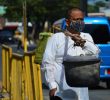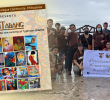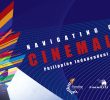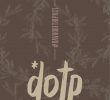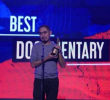In his new book, award-winning writer and historian Macario Tiu attempts to set straight the myths and inaccuracies of Davao�s history. Why, he asks, should Datu Bago be depicted as a pirate � and not the Basque invader Uyanguren? He remembers the heroic acts of Davaoe�os past and present. “The task is to locate more of these heroic men and women who have done a great deed in defense of Davao, of the country and reclaim them from oblivion.”
By Tyrone A. Velez
davaotoday.com
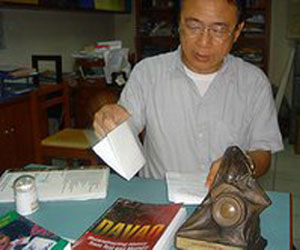 DAVAO CITY — The trophy that Davao writer Macario Tiu won from the National Book Award for his book on Davao history is, of all things, a sculpted camera.
DAVAO CITY — The trophy that Davao writer Macario Tiu won from the National Book Award for his book on Davao history is, of all things, a sculpted camera.
“I’m figuring out why the sculptor designed the trophy this way,” Tiu pondered as he took the award off the shelf in his office in Ateneo de Davao University’s Tambara Office. “Perhaps it suggests that writers want to show the readers a picture of the world.”
That may well describe Tiu’s effort in Davao: Reconstructing History Through Text and Memory, where he presents a vivid narrative of Davao’s growth and identity and its resistance against Spanish and American colonization.
The book provides new insights into Davao’s history gathered from the writer’s research of the oral traditions and histories of Lumad and Moro communities.
Tiu, a professor of literature at the Ateneo de Davao, a detainee during martial law and a two-time Palanca awardee, said the book was about telling history from the view of the Filipino.
“Previous history books started their record of Davao with its conquest by Jose Oyanguren in 1848,” he said in an interview with davaotoday.com. “Not much else was said about Davao before that.” Oyanguren was the Basque conqueror who came and set Spanish rule in the Davao province.
This version of history only reflected the western and elite bias that relied on foreign documents and sources, said Tiu.
For instance, Oyanguren was considered a central figure in Davao’s history, while Datu Bago, a native who fought Oyanguren’s troops, was branded as a pirate.
“Aren’t pirates the invaders of a land? Then, isn’t Oyanguren the pirate in our history?” Tiu quipped.
For that, Tiu sought other sources of information, the oral literature of the elders of the tribes � accounts of events, folklores, even myths. These he called “memory documents” as it preserves the communities’ histories.
These “documents” shaped the book’s vast narratives, from the history of the 15 tribes in Davao, the stories of the Davao settlers, the arrival of the Spanish and American colonizers and expansion of American plantations, and the resistance of the Davao people, the heroes, myths and legends.
The book gives in-depth accounts of Davao heroes. For instance there is the story of Mangunlayon, “the only Lumad who succeeded in killing the highest American official of a local government in the Philippines,” Davao’s district governor Lt. Edward C. Bolton.
There is also Datu Bago, the antithesis of Oyanguren, wherein the book accounts of his life and traces his lineage to the Maguindanaoan royalty, contrary to belief that he is of Bagobo lineage.
Interestingly, Tiu included the stories of anti-martial law martyrs in Davao, the likes of labor leader Alex Orcullo of the Kilusang Mayo Uno, who was murdered on Oct. 19, 1984, and of Socorro Par, a youth activist killed in 1985 in South Cotabato.
Tiu explained: “In the Philippine context, wherein the history of the people’s struggle is to become free or to remain free, anybody who fights for that freedom is a hero.”
In his book, he makes this call to remember the heroic acts of Davaoe�os past and present: “The task is to locate more of these heroic men and women who have done a great deed in defense of Davao, of the country and reclaim them from oblivion.”
This task has started with the book, which seeks to restore Davao’s past and identity. It is a laudable effort, as cited by Soledad Reyes, panelist of the National Book Award: “Tiu offers an alternative to �official history� even as he proceeds to demonstrate the wealth of insights such texts from indigenous communities possess as indices to the consciousness of the people of Davao.” (Tyrone A. Velez/davaotoday.com)
Indigenous Peoples
